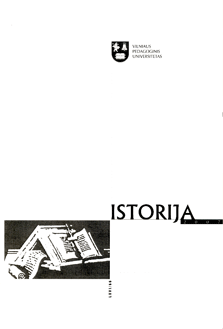Moterų tematika Europos parlamento rinkimų kampanijoje
Gender Issue During the 2004 European Parliament Election
Author(s): Irmina Matonytė, Aurelija NovelskaitėSubject(s): Politics / Political Sciences
Published by: Vytauto Didžiojo Universitetas
Summary/Abstract: Political communication studies are based on the axiom that electoral campaign, political rhetoric, symbolic gestures in public sphere, etc. influencethe electoral choice. Hovvever, the electoral results as such are not and cannot be the research object of communication studies; the dissemination of a wider representation in the contemporary democratic world is more important. Representation includes two essential dimensions: 1) political speech in the name of others and 2) participation by word and vision in public life. Contemporary mass communication studies emphasize public interests and pay special attention to the second dimension of representation. Researchers underline that the mass media take initiativetoconstruct public political values, priorities and interests. Contemporary VVestern political communication research starts considering the feminist critique which emphasizes that citizens (electors, candidates and politicians) are gendered sočiai beings and gender interpretations in public discourse influence the contentand forms of the representational democracy. New research data in Lithuania uncover a rather confusing understanding of equal gender opportunities. On one hand, studies show that contemporary Lithuanian society is quite egalitarian and does not express strong negative attitudes tovvards vvomen's career. On the other hand, political realm and better-paid occupations are clearly orientated tovvards malė aspirants. Actually, Lithuania is still far from gender parity, which is of political and public value, while women issues remain rather external to the public discourse and political campaigns. Empirical research presented in the article is focused on the monitoring of the two biggest national dailies in the period of the European Parliament (EP) election -Lietuvos rytas and Respublika. The research is composed of two parts: 1) the review of the coverage of the EP election in the main Lithuanian dailies and 2) the coverage of vvomen issues in the EP campaign. The analysis of data confirms that the mainstream liberal daily Lietuvos rytas devoted quantitatively more attention to the EP election than did rather alternative (liberal) daily Respublika. The publications in the Lietuvos rytas had more neutral character, while the Respublika used to employ more emotionally appealing style. Both newspapers were only randomly vocal about gender issues in the EP electoral campaign. Monitoring of gender issues coverage in the EP campaign provided by two major Lithuanian dailies revealed that the mass media follovved the electoral campaign superficially and was disinterested in vvomen as a campaign issue. The conducted press review revealed the fact that women-mentions did not present any political stakes and did not exercise any sensible social representation re-shaping action other than to make the women issues redundant and relatively abusive in terms of contemporary feminist thinking. In other words, content research of the t
Journal: Istorija. Lietuvos aukštųjų mokyklų mokslo darbai
- Issue Year: 66/2007
- Issue No: 2
- Page Range: 54-65
- Page Count: 12
- Language: Lithuanian

